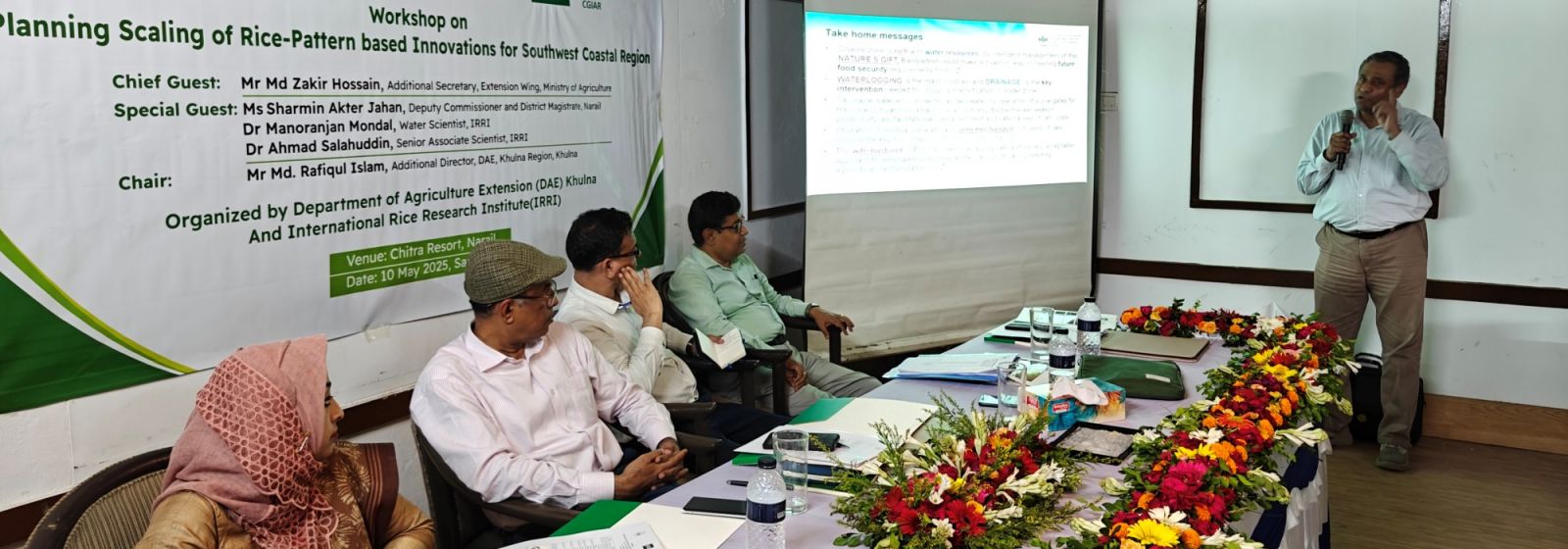Building Climate Resilience in Coastal Bangladesh through Scalable Rice-Based Innovations

Stresses such as salinity and waterlogging makes the coastal region of southwest Bangladesh more vulnerable to climate change. These challenges further risk the rice farming systems and livelihoods of the smallholder farmers of the region. With the decrease in land productivity and effectiveness of traditional cropping patterns, there is an urgent need for collaborative action to scale and adopt climate-resilient and diverse farming practices.

To address this, IRRI and the Department of Agricultural Extension (DAE), Khulna jointly organized a technical workshop on Planning the Scaling of Rice-based Innovations for the Southwest Coastal Region. Held on 10 May 2025 at Chitra Resort in Narail, the workshop brought together regional and national stakeholders/partners including government agencies, and scientific institutions to identify scalable solutions for improving agricultural productivity and strengthening resilience in the coastal polders or the low-lying coastal farming areas.
The half-day technical workshop featured evidence-based discussions focused on soil and water constraints, and the need for more adaptive, site-specific cropping strategies. IRRI scientists presented several innovative climate-smart technologies tailored for rice farming in the coastal landscape.
Dr. Sharif Ahmed highlighted the positive effect of improved agricultural practices, mechanization and entrepreneurship on productivity and market opportunities. Dr. Ahmad Salahuddin emphasized the need for strong community engagements, institutional reforms and the use of tools like CS-MAP for effective water and climate risk management. Dr. Manoranjan Mondal presented the Climate-Resilient Community Farming System (CCFS) model, which integrates coordinated community action with technical innovations, offering a scalable pathway for sustainable intensification in coastal polders.

Representatives from DAE, Climate Smart Project, the Soil Resources Development Institute (SRDI), the Horticulture Department shared complementary solutions to support crop diversification, including oilseed crops, pulses, maize, and spices, as well as approaches to restore soil health and optimize water use.
Stressing on the importance of inclusive extension strategies and private sector involvement, Mr. Md Zakir Hossain, Additional Secretary at the Ministry of Agriculture said,“We must develop thousands of entrepreneurs to act as value chain and market actors if we are to effectively scale agricultural innovations.”

The workshop also featured a brief account on of the polder and canal infrastructure in the region and how its deterioration affects cropping systems and water management. Group discussions highlighted the importance of integrating policy, science, and local knowledge in shaping future interventions.
By convening diverse stakeholders and promoting science-driven dialogue, the workshop marked a pivotal step toward building a shared vision for scaling sustainable rice-based innovations in Bangladesh’s most climate-vulnerable region.